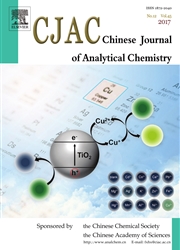

 中文摘要:
中文摘要:
利用基于质谱的代谢组学方法考察了人参总皂苷(TG)治疗糖尿病心肌病(DCM)大鼠的效应机制;建立了糖尿病心肌病大鼠模型,并连续12周口服人参总皂苷,采用快速高分辨液相色谱/四级杆-飞行时间/质谱(RRLC/Q-TOF/MS)技术对糖尿病心肌病模型组(DCM组)和人参总皂苷治疗组(TG组)大鼠尿样的尿液代谢物进行分析,采用主成分分析(PCA)对两组代谢物进行分类,并寻找潜在生物标记物,同时检测心肌病理超微结构、血液生化指标和心肌氧化应激水平。RRLC/Q-TOF/MS检测结果表明,DCM组和TG组大鼠的尿液代谢物谱能得到很好的区分,发现并鉴定了3种生物标记物。TG降低了DCM大鼠心肌超微结构损伤并改善其血脂、血糖及心肌氧化应激水平,代谢组学研究结果表明:作用机制可能是TG对柠檬酸循环、脂肪酸代谢和氧化应激水平的调节作用。
 英文摘要:
英文摘要:
A urinary metabonomics method based on rapid resolution liquid chromatography/mass spectrometry (RRLC/MS) was developed to study the effect mechanism of Total Ginsenoside (TG) on streptozotocin(STZ) induced Diabetic Cardiomyopathy (DCM) rats. Twenty-four STZ-induced diabetic rats were randomly divided into DCM group and TG group. DCM group was administrated with TG 30 mg/kg body weight once a day by gastric irrigation. TG group was administrated with water by gastric irrigation in parallel. Ten healthy rats were defined as control group and were also administrated with water by gastric irrigation in parallel. After twelve-week continuous irrigation, 24 h urine samples of rats in the three group were collected and analyzed by RRLC/MS. Principal component analysis (PCA) was carried out for pattern recognition and a clear separation between DCM rats and those treated with TG was achieved. Three potential biomarkers were found and identified. The significant changes of these biomarkers indicated the pharmacological effects of TG on the metabolism of rats. TG can regulate the metabolism of body include citrate cycle, fatty acid metabolism and oxidative stress. The results shows the metabonomics is a useful tool in effect mechanism research of natural product and this work is helpful in the effect mechanism study of Panax ginseng.
 同期刊论文项目
同期刊论文项目
 同项目期刊论文
同项目期刊论文
 Classification of type 2 diabetes rats based on urine amino acidsmetabolic profiling by liquid chrom
Classification of type 2 diabetes rats based on urine amino acidsmetabolic profiling by liquid chrom Characterization and immunostimulating effects on murine peritoneal macrophages of oligosaccharide i
Characterization and immunostimulating effects on murine peritoneal macrophages of oligosaccharide i Anti-tumour and immunomodulatory activities of oligosaccharides isolated from Panax ginseng C.A. Mey
Anti-tumour and immunomodulatory activities of oligosaccharides isolated from Panax ginseng C.A. Mey Rapid identification of traditional Chinese herbal medicine by direct analysis in real time (DART) m
Rapid identification of traditional Chinese herbal medicine by direct analysis in real time (DART) m Antioxidant activities of the oligosaccharides from the roots, flowers and leaves of Panax ginseng C
Antioxidant activities of the oligosaccharides from the roots, flowers and leaves of Panax ginseng C -Cyano-4-hydroxycinnamic acid, sinapinic acid, and ferulic acid as matrices and alkylating agents fo
-Cyano-4-hydroxycinnamic acid, sinapinic acid, and ferulic acid as matrices and alkylating agents fo Argon direct analysis in real time mass spectrometry in conjunction with makeup solvents: a method f
Argon direct analysis in real time mass spectrometry in conjunction with makeup solvents: a method f Differentiation of Disaccharide Isomers by Temperature-Dependent In-Source Decay (TDISD) and DART-Q-
Differentiation of Disaccharide Isomers by Temperature-Dependent In-Source Decay (TDISD) and DART-Q- Identification of reducing and nonreducing neutral carbohydrates by laser-enhanced in-source decay (
Identification of reducing and nonreducing neutral carbohydrates by laser-enhanced in-source decay ( Identification of isomeric disaccharides in mixture by the 1-phenyl-3-methyl-5-pyrazolone labeling t
Identification of isomeric disaccharides in mixture by the 1-phenyl-3-methyl-5-pyrazolone labeling t Simultaneous determination of amino acid and monoamine neurotransmitters in PC12 cells and rats mode
Simultaneous determination of amino acid and monoamine neurotransmitters in PC12 cells and rats mode Effect of 20(S)-ginsenoside Rg3 on streptozotocin-induced experimental type 2 diabetic rats: a urina
Effect of 20(S)-ginsenoside Rg3 on streptozotocin-induced experimental type 2 diabetic rats: a urina alpha-Cyano-4-hydroxycinnamic acid, sinapinic acid, and ferulic acid as matrices and alkylating agen
alpha-Cyano-4-hydroxycinnamic acid, sinapinic acid, and ferulic acid as matrices and alkylating agen Gas-phase fragmentation of oligosaccharides in MALDI laser-enhanced in-source decay induced by therm
Gas-phase fragmentation of oligosaccharides in MALDI laser-enhanced in-source decay induced by therm Differentiation of glucose-containing disaccharides isomers by fragmentation of the deprotonated non
Differentiation of glucose-containing disaccharides isomers by fragmentation of the deprotonated non Structural characterization and immunological activities of the water-soluble oligosaccharides isola
Structural characterization and immunological activities of the water-soluble oligosaccharides isola 期刊信息
期刊信息
